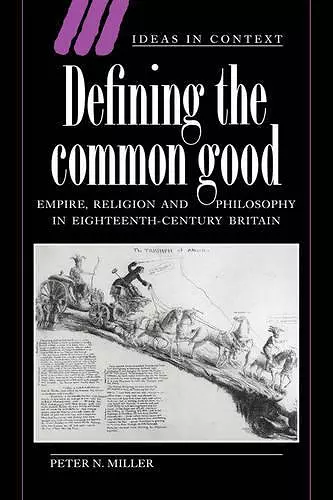Defining the Common Good
Empire, Religion and Philosophy in Eighteenth-Century Britain
Format:Hardback
Publisher:Cambridge University Press
Published:16th Jun '94
Currently unavailable, and unfortunately no date known when it will be back
This hardback is available in another edition too:
- Paperback£34.99(9780521617123)

This book focuses on the political thought of late eighteenth-century Britain, discussing the crisis of the early modern state provoked by the American revolution and setting it in its European context.
This book discusses the crisis of the early modern state in eighteenth-century Britain sparked off by the American revolution. It sets the crisis in its European context and traces the evolution of influential political ideas which continue to resonate today in the principles of 'one man, one vote' and 'freedom of thought'.The theme of this book is the crisis of the early modern state in eighteenth-century Britain. The revolt of the North American colonies and the simultaneous demand for wider religious toleration at home challenged the principles of sovereignty and obligation that underpinned arguments about the character of the state. These were expressed in terms of the 'common good', 'necessity', and 'community' - concepts that came to the fore in early modern European political thought and which gave expression to the problem of defining legitimate authority in a period of increasing consciousness of state power. The Americans and their British supporters argued that individuals ought to determine the common good of the community. A new theory of representation and freedom of thought defines the cutting edge of this revolutionary redefinition of the basic relationship between individual and community.
' … Miller triumphantly succeeds in a work of sustained sophistication and remarkably wide learning … a powerful and remarkable vision which demands attention.' Jonathan Clark, The Times Literary Supplement
ISBN: 9780521442596
Dimensions: 229mm x 152mm x 32mm
Weight: 880g
488 pages